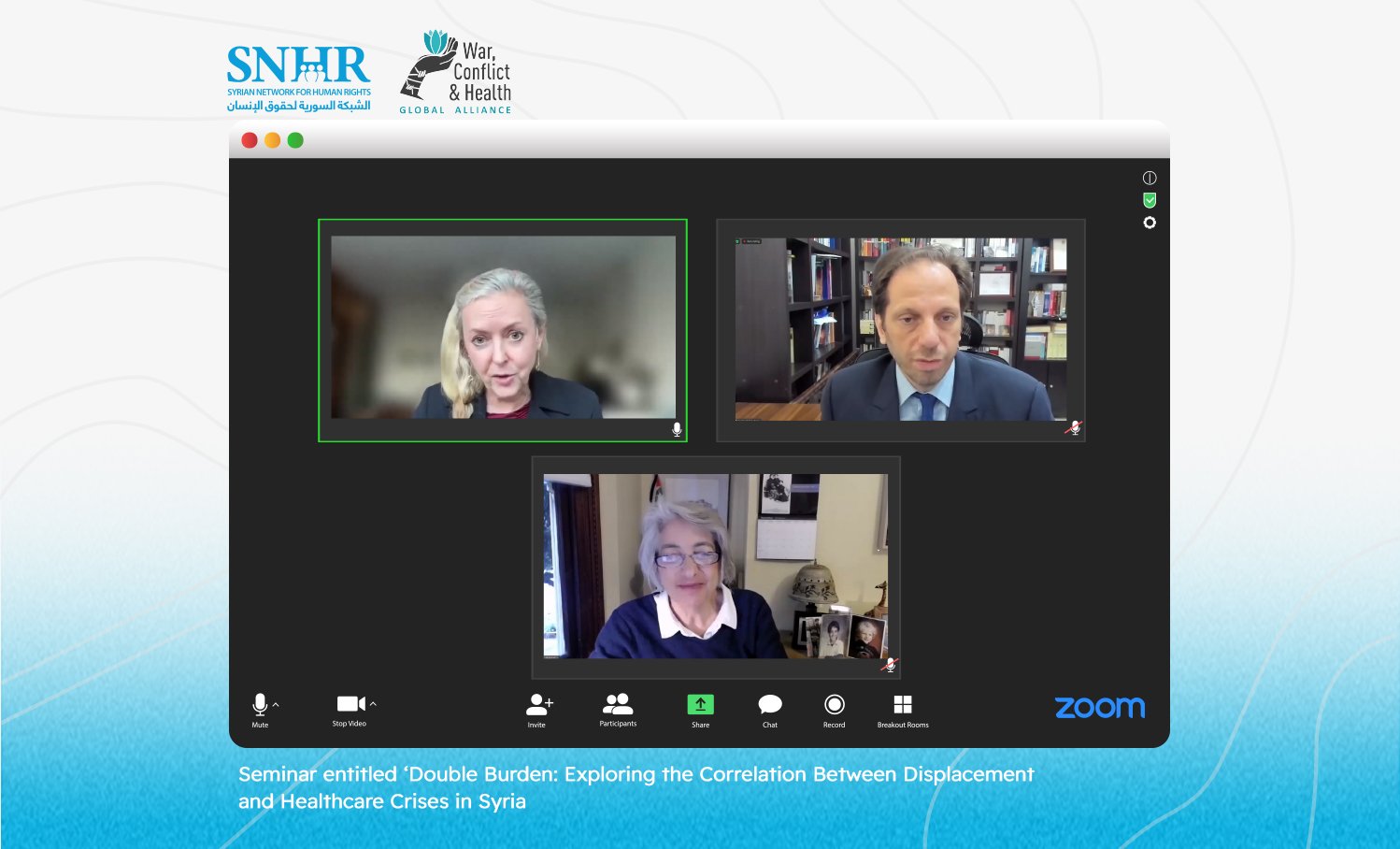
Available In
The Hague – The Syrian Network for Human Rights:
On Thursday, September 19, 2024, the Syrian Network for Human Rights (SNHR) participated in a seminar entitled, ‘Double Burden: Exploring the Correlation Between Displacement and Healthcare Crises in Syria’, which was organized by the Global Alliance on War, Conflict & Health (GAWCH) in partnership with SNHR.
The webinar focused on analyzing the impact of the systematic attacks targeting medical facilities in Syria, specifically regarding the availability and quality of healthcare provided to internally displaced persons (IDPs) since 2011, with particular emphasis on the healthcare challenges faced by IDP children as a result of these attacks. The speakers also discussed what can be done to improve the process of collecting, verifying, and publishing data on attacks targeting medical facilities in order to make better decisions on policies and assistance. Questions about action the international community can take to respond more efficiently and prevent attacks on healthcare infrastructure in conflict zones were also discussed, as well as the nature of the long-term ramifications on public health resulting from the continued attacks against healthcare systems designated for IDPs in Syria, and how to alleviate these effects.
The seminar featured Dr. Annie Sparrow, a Fellow at the Royal Australasian College of Physicians (RACP), and Fadel Abdulghany, SNHR Executive Director.
Mr. Abdulghany spoke about the relationship between healthcare crises and internal displacement, focusing particularly on the state of the targeted medical facilities in Syria. He stressed that the systematic targeting of medical facilities during the Syrian conflict had greatly exacerbated the humanitarian crisis by contributing to mass internal displacement, severe deficiencies in healthcare, and the deterioration of the overall health of the country’s peoples, all of which are factors which emphasize the urgent need to improve international legal frameworks to protect healthcare in conflict zones.
Mr. Abdulghany also emphasized that the magnitude and systematical nature of attacks on healthcare facilities in Syria are unprecedented, and that in this they constitute deliberate and calculated war crimes. These attacks have destroyed the healthcare infrastructure, creating waves of mass displacement, as civilians have been forced to flee repeatedly in search of basic medical services and security. The erosion of access to healthcare, he added, has created dangerous gaps in basic services, increased rates of diseases and deaths, and led to the resurgence of preventable diseases. He also stressed that the international community’s response, while vital, has been insufficient to prevent attacks and ensure accountability, which also underlines the need for far stronger legal and diplomatic measures.
SNHR has documented at least 897 attacks on medical facilities by the parties to the conflict and controlling forces in Syria since March 2011 up until August 2024. In addition, at least 879 medical personnel have been killed, while at least 3,428 healthcare workers, including 286 women, are still detained and/or forcibly disappeared. There are currently about 6.8 million IDPs in Syria, according to the UN Refugee Agency (UNHCR).
In concluding his speech, Mr. Abdulghany stressed that measures must be taken to improve monitoring and reporting of attacks on healthcare, as well as to employ targeted sanctions and other measures to pressure the Syrian regime and other parties to the conflict to comply with their obligations.
He added that emphasis should be placed on the implementation and enforcement of existing international humanitarian law and human rights law provisions related to the protection of healthcare in conflict. This includes encouraging states to globally ratify and locally implement relevant treaties, such as the Geneva Conventions and their Additional Protocols, as well as the Rome Statute of the International Criminal Court. It also involves engaging with armed groups to enhance their understanding and respect for the rules governing the protection of healthcare in conflict, and ensuring their commitment to refraining from attacking healthcare facilities and personnel.
Additionally, he noted, efforts should focus on strengthening legal protection through domestic implementation of international humanitarian law and international human rights law. While most countries have ratified the Geneva Conventions and other relevant treaties, many have not fully integrated these obligations into their domestic legal frameworks. There also exists a need address the root causes of attacks on healthcare in conflict zones, including the politicization and militarization of healthcare. Furthermore, greater political will and resources to protect healthcare in the context of armed conflict in Syria must be mobilized. This includes advocating for prioritizing this issue on the international agenda, including through the UN Security Council, the Human Rights Council (HRC), and other relevant platforms.
Mr. Abdulghany also emphasized that enhancing legal protection for healthcare workers and facilities is essential, as along with the implementation of mechanisms for investigating and prosecuting violations, in order to ensure the safety and security of healthcare workers in conflict-affected environments and hold those responsible for attacks on healthcare accountable, thereby deterring such attacks in the future. Without effective legal protection and accountability measures, he stressed, attacks on healthcare will continue to undermine the provision of essential medical services, exacerbate the suffering of civilian populations, generate further displacement, and perpetuate cycles of violence and instability.
To watch the event in full, please visit the link here.


